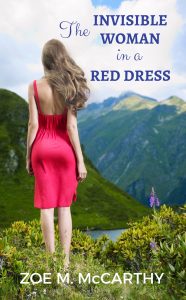Suppose you were offered a three-week stay at a comfortable hideaway to write a book. What ten things would you take? Here’s my list of essentials and why I’d need them.
1. Rules of engagement.
I’ll post these rules in a visible spot:
- Nix thoughts about problems or upcoming events. Bring a taser to punish infringements.
- Lock my cell in my car or rental. Use for emergencies only. Running out of underwear is not an emergency.
- Eat out only once a week. Fast food only.
- Forget social media exists. Check emails only twice a day.
2. My two laptops, portable printer, chargers, and a ream of paper.
-
If one laptop gets overheated, I can open my manuscript on the other from Dropbox. - I can look at research on one laptop while I type on the other.
-
Sometimes I need to have a printed version to highlight items or put check marks on. It’s a feel-good thing.
3. Hero’s Journey Outline and Description.
I use this tool to roughly plot my entire story quickly. I’ll write the story by the seat of my pants from the this outline.
4. Printed blank calendar.
- I’ll print the month sheets for the time period covered in my novel.
- Using my Hero’s Journey outline, I’ll jot story events in the calendar boxes in pencil. The calendar helps me avoid contradictory, awkward, or impossible timing of events.
- I’ll tack the sheets to the wall to easily see the layout of events as I progress my story.
5. Scrivener.
- Scrivener is my writing software. I use a fraction of its functions, but I like the ease of creating a manuscript.
- The sidebar shows me all my named scenes so I can quickly find the scene I want to check or edit.
- Getting word count for manuscript, chapters, or scenes is a snap. So is moving scenes from one chapter to another.
- I can copy research into named folders under the research folder.
6. Dictionary and Thesaurus.
- I use my Mac dashboard, Microsoft Word, and Scrivener dictionaries and thesauruses. It seems like I check every other word’s definition and hunt constantly for synonyms.
- I want my hard copies of The Merriam-Webster Dictionary (my editor uses this one) and some specialized dictionaries.
7. My writing grammar books and manuals.
I can never remember some grammar rules and style preferences, and new grammar questions arise.
8. Google and Research Notes.
I do look-ups on google for how, when, where, who, why, and what of things from pigs to names of tie knots.
9. My “Love” Playlist.
I need silence when I write. But I write romances, so sometimes I like to listen to my favorite love songs while I write those romantic scenes.
10. My editing checklist.
I have a comprehensive checklist, which will be published in my upcoming book, Tailor Your Fiction Manuscript in 30 Days. It’s designed so writers can customize the checklist to their problem areas and where they need reminders.
Bonus: A local pizza delivery telephone number.
I’m sure I’ll get tired of soups and snacks.
Ten essentials I’d take on a three-week writers retreat. Click to tweet.
What would you take on your three-week writing retreat?
Candace Parks lives a passionless life in Richmond, Virginia. The computer programmer returns to the empty family home in the Blue Ridge Mountains to evaluate her job, faith, and boyfriend. Her high school crush, star football player and prom king Trigg Alderman, is in Twisty Creek visiting his grandmother who lives next door to Candace’s family home. He doesn’t recognize her at first and remembers little about her. He’s not alone. Candace’s rekindled attraction to Trigg adds unexpected complications to finding her passions. Sorting her life out? How about nothing of the sort!










Zoe, thank you for those outstanding ideas! I especially love the idea of having two computers- I hadn’t thought of that. The Hero’s Journey is something I learned about in my Ph.D. program, so you are in really good company there. Thank you for the time you take to help others!
Hi Sheri, the two computers are by default. My MacBook Air, which I love, was getting old and overheating sometimes, so I got a MacBook Pro. I realized how helpful it was to have two Macs when I wrote the lesson for the Community Bible study I teach. I could have the Bible or research open on my Pro, which had enough storage to host Logos (Bible software), and write the lesson on my Air.
Great ideas, Zoe. My tech is pretty basic, Word and Excel, but I hope to ratchet it up in the near future. What’s more exciting to me is the idea of THREE WEEKS with nothing to do but WRITE! I can’t imagine…
Kathy, wouldn’t three weeks be great? I may have to make it happen (maybe a week or two weeks) so I can meet my next deadline.
Zoe, I especially like the idea of a calendar to plot the timeline of the story. I have found a calendar like that with the timeline of the Israelites’ wilderness journey and it has helped me tremendously.
I think I would have to pack a “Do Not Disturb” sign as well – since I have a ready made get-away, with one little problem – it’s in a retirement park where everyone checks up on you if they don’t see you at least once in awhile. Well meaning interruptions would be bound to occur.
I would take the dog too because I would need to get up and walk around every so often or else i would have a major arthritis flare up. Since the dog has to go out every so often, I would get some fresh air and a break to reset my brain. LOL!
Hi Bonnie, Yes if the retreat place was in a place like your cabin, a Do Not Disturb sign would be good to pack. Good idea for the dog for exercise.
Wow. The idea of 3 weeks to write with nothing else pressing is amazing. I like your list, especially the love song playlist.
I like the thought of three week to do nothing but write. WOW. The use of a calendar to track events is a good idea. I tend to date chapters on my draft copy to help me, but yours is a better idea. I would have to bring pretzel rods and M&Ms too!
Regina, I would have to have 6 large Good & Plenty boxes!
What a marvelous list. I think you have inspired many of us to try for a big chunk of writing time. I’m going the wrong direction on that, so you’re giving me fresh resolve.